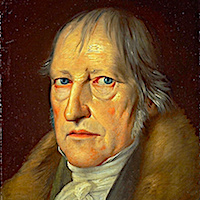

Tao Te Ching

Jakob Schlesinger
Georg Hegel
(Wilhelm Friedrich)
1770 – 1831 CE
Dialectical Philosopher
influential philosopher, developer of "absolute idealism," and political theorist; Hegel worked to integrate history, religion, and art into his philosophy. This led to an integration of dualisms and an amplification of Fichte's thesis-antithesis-synthesis triad. His methods became deeply influential on both contemporary and later schools and thought leaders—even for those who strongly disagreed with his philosophy like Kierkegaard, Marx and Engels—existentialism, Historical materialism, and British Idealism. His writings—rejected and banned by both right wing and left wing politicians—became an incipient influence on many or most of the philosophical schools that came after him: Marxism, phenomenology, German existentialism, and even psychoanalysis
Eras
Chinese
Qing dynasty (1644 – 1912 CE)Unlisted Sources
Quotes by Georg Hegel (3 quotes)
“The Temple of Zion is destroyed; the God-serving nation is scattered to the winds.”
Comments: Click to comment
“[With Heraclitus] we see land; there is no proposition of Heraclitus which I have not adopted in my Logic.”
Comments: Click to comment
“Virgil seems to have copied Greek models completely, imitating them slavishly and lifelessly, and so they appear as plagiarisms more or less devoid of spirit.”
Comments: Click to comment
Quotes about Georg Hegel (2 quotes)

“Of the 19th century philosophers, Hegel put me off by his language, as arrogant as it was laborious; I regarded him with downright mistrust. He seemed to me like a man who was caged in the edifice of his own words and was pompously gesticulating in his prison.”
Comments: Click to comment

“an age which for 20 years has applauded a Hegel—that intellectual Caliban—as the greatest of the philosophers, so loudly that it echoes through the whole of Europe... it's applause is prostituted, and its censure has no significance”
Comments: Click to comment
Comments (0)